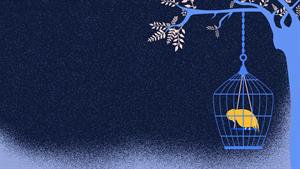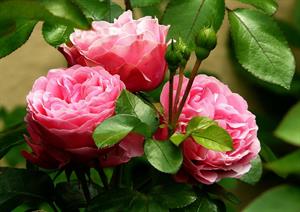
PUMPA - SMART LEARNING
எங்கள் ஆசிரியர்களுடன் 1-ஆன்-1 ஆலோசனை நேரத்தைப் பெறுங்கள். டாப்பர் ஆவதற்கு நாங்கள் பயிற்சி அளிப்போம்
Book Free Demo"The School Boy" is a poem written by William Blake. It was first published in 1789 in his collection "Songs of Experience". Blake later combined these poems with his "Songs of Innocence" in a book titled "Songs of Innocence and Experience Shewing the Two Contrary States of the Human Soul".
The poem is divided into six stanzas with five lines each. While the original poem contains 30 lines, the prescribed one is short of the final three lines. Hence, the last stanza of the prescribed poem is made up of two lines instead of the actual five lines.
The poem is divided into six stanzas with five lines each. While the original poem contains 30 lines, the prescribed one is short of the final three lines. Hence, the last stanza of the prescribed poem is made up of two lines instead of the actual five lines.
As the title of the poem "The School Boy" suggests, the speaker of the poem is a young school-going boy. The poem begins with the speaker stating that he loves waking up on a summer morning. ‘The birds that are found singing on every tree’, ‘the sound of the horn from a hunter in the distance’, and ‘the skylark that can be heard singing along with the speaker’ make the summer morning special to him. He enjoys the morning so much for what had accompanied it, and hence, calls it a "sweet company".

A huntsman winds his horn
It is interesting to note how the poet is visualizing a concert in the summer morning. The stanza begins with the music from the birds. The birds are occupying every tree as if taking their position like the musicians in an orchestra or concert. The music also includes the sound of a horn let out by a hunter hunting in the distance. The speaker is so happy that he joins the music; he sings, and to his delight, Skylark, a bird known for its songs, sings with him. The morning is so pleasant, and the speaker immerses himself in nature's concert.

The birds sing on every tree
Hence, through the first stanza, the speaker expresses his delight in the beauty of summer morning. One should remember that the summer that is referred to in the poem denotes the summer experienced in England. Summer, which begins around June and lasts through August, is not as hot as the summer experienced in India. Moreover, the season often signifies life. It is also an ideal time when various sports and recreational activities, such as hunting, occur. Hence, the mention of "huntsman".
The second stanza witnesses a shift in the tone of the poem. In the previous stanza, the speaker had expressed his happiness and hope, and he could be seen rejoicing in the beauty of a summer morning. However, the second stanza (and those that follow) displays the dismay and joylessness felt by the speaker. The speaker claims that going to school in the morning on a summer day deprives him of all joy.
Children must spend the entire day at school under the supervision of a teacher whose primary job is to ensure that they adhere to the rules and regulations. Here, the speaker compares the teacher to a cruel eye. The “eye” in the stanza is an example of synecdoche- a figure of speech in which a part of something refers to its whole. The eye is being used to refer to the entire person (i.e., the teacher).
Children must spend the entire day at school under the supervision of a teacher whose primary job is to ensure that they adhere to the rules and regulations. Here, the speaker compares the teacher to a cruel eye. The “eye” in the stanza is an example of synecdoche- a figure of speech in which a part of something refers to its whole. The eye is being used to refer to the entire person (i.e., the teacher).

The unsympathetic attitude tires the students
Back to the poem, the children are kept under constant supervision and are required to follow rules that make their lives miserable— the teacher's unsympathetic attitude tires the students. As a result, the young ones spend their days in grief and distress.

The young ones spend their days in grief and distress
The third stanza describes how the boy spends his day at school. He claims that he frequently spends a lot of time doing nothing exciting. The phrase "I drooping sit" explains the lack of interest in the boy. Moreover, it is crucial to have a good posture for your health and well being. However, we see that the boy’s back is "drooping", and no one is bothered enough to correct his posture. This also shows the lack of attention given to individuals in schools.
Back to the poem, we see how the speaker claims that he spends several hours anxiously. The speaker is anxious because he is too eager to be out in the open space. He also claims that his books never bring him joy or happiness. Nor can he sit inside his classroom listening to the dull lectures. Here, the phrase "learning's bower" refers to the school. The word bower means a room or a house, and hence, the expression "leaning's bower" can be roughly translated as a place where learning occurs.
Back to the poem, we see how the speaker claims that he spends several hours anxiously. The speaker is anxious because he is too eager to be out in the open space. He also claims that his books never bring him joy or happiness. Nor can he sit inside his classroom listening to the dull lectures. Here, the phrase "learning's bower" refers to the school. The word bower means a room or a house, and hence, the expression "leaning's bower" can be roughly translated as a place where learning occurs.
Sitting in the classroom makes the speaker weary as he has to go through the "dreary shower" of learning. Here, the phrase "dreary shower" refers to the lectures and education that are dull. The lines reveal the speaker's impatience to free himself from the monotonous school life, get out of the walls of his classroom, and experience the true beauty the summer has to offer. The stanza also reveals the schoolboy's dissatisfaction with the way schoolwork or education is done.

The boy is anxious to get away from the school
In the fourth stanza, the schoolboy raises a couple of rhetorical questions. The speaker begins the stanza with the question, “How can the bird that is born for joy sit in a cage and sing?” Here, he compares himself to a caged bird. A bird is meant to be free, and it should sing and fly as it wishes. However, when birds are caged, their very nature to fly and be free are snapped away from them.
Similarly, a child should be let free to explore and create. Unfortunately, schools stop the kids from being creative and imaginative. The schools are confinement to the kids as the cages are for the birds.
Schools are often associated with punishments and fear. As a result, the child's wings of imagination and possibilities are restrained, and he is made to forget his youthful spring.
In the stanza, bird and cage are used as metaphors for child and school, respectively.
Schools are often associated with punishments and fear. As a result, the child's wings of imagination and possibilities are restrained, and he is made to forget his youthful spring.
In the stanza, bird and cage are used as metaphors for child and school, respectively.

The speaker compares his plight to that of a caged bird
The fifth stanza introduces two new characters to the poem: his father and mother. In the stanza, and that which follows, the speaker can be seen trying to make his parents see why it is pointless to go to school, especially during a summer morning. According to the speaker, a school is a place where a child's individuality and independence are snatched away.
The speaker compares his life to those of plants whose buds have been nipped away and flowers have been blown out. He adds that he is in a situation similar to that of a young plant whose life has been snapped away during the spring season.

Buds and blossoms
Like the tender plants, the child has just begun to grow up, but he is soon left in sadness and dismay through the meaningless education system.

A child is like a tender plant
The poem’s final stanza, which is made up of two lines, poses a question to the speaker’s parents. Resuming the thought from the previous stanza, the speaker asks his parents how can summer be enjoyable when there is a lot of destruction happening within him. His freedom and joy are clipped and thrown away, and yet, he is expected to be happy and content.
He wonders how a plant can produce fruit when the bud and blossoms are plucked away. Likewise, how can a child grow into a talented, caring, creative, and successful person if the very childhood is stolen away from them?
The poem ends in a rhetorical question posed not only to the parents but also to society. The poem is a call to action against the constraining, cage-like educational system and the intolerable pressure and expectations forced upon the kids by their parents.
He wonders how a plant can produce fruit when the bud and blossoms are plucked away. Likewise, how can a child grow into a talented, caring, creative, and successful person if the very childhood is stolen away from them?
The poem ends in a rhetorical question posed not only to the parents but also to society. The poem is a call to action against the constraining, cage-like educational system and the intolerable pressure and expectations forced upon the kids by their parents.

When schools become prisons